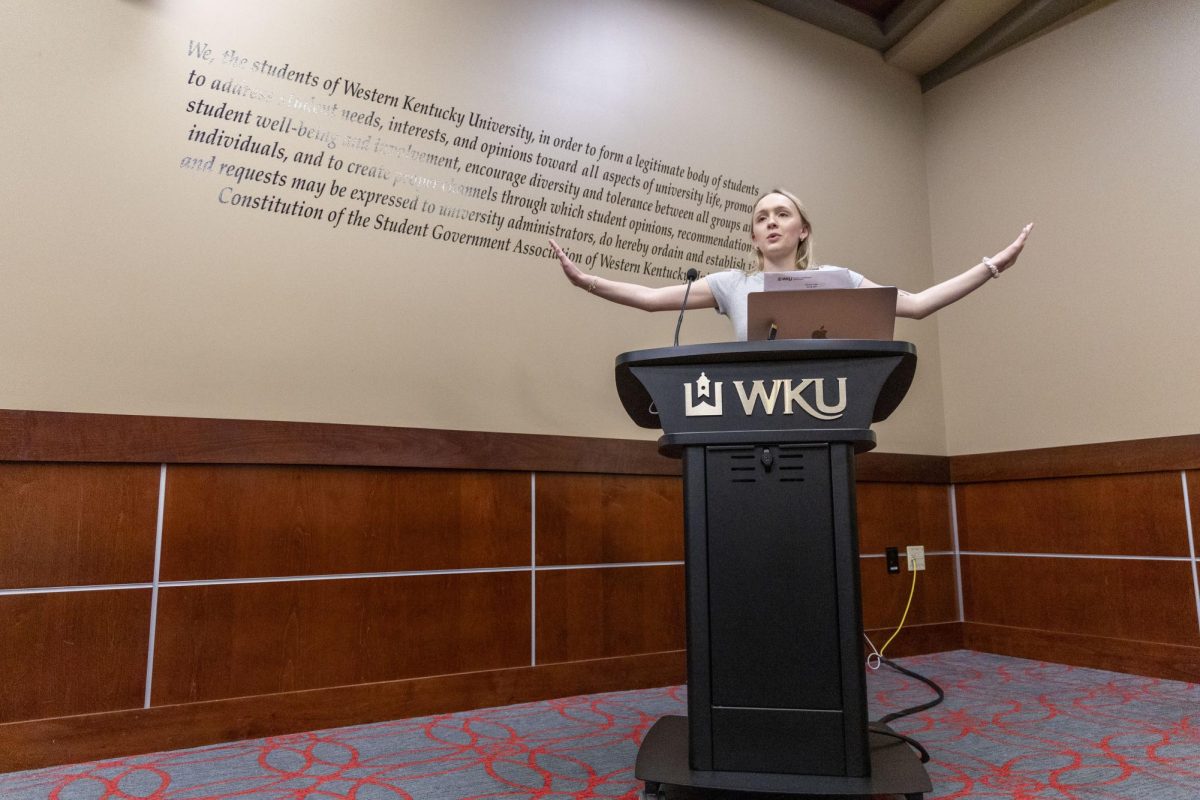SGA Executive Cabinet smoke-free resolution veto statement
November 21, 2014
The Student Government Association Executive Cabinet provided the Herald with its statement to veto Resolution 11-14-F, Resolution to Support a Smoke Free Campus, on Thursday via email.
The email is below:
“We, the members of the Student Government Association Executive Cabinet, have voted to veto Resolution 11-14-F, “Resolution to Support a Smoke Free Campus.” Our rationale behind this decision lies within enforcement, the housing requirement, the needs of the smoking minority, safety, and practicality.
First, we believe that this smoking ban lacks proper enforcement procedures. President Ransdell has expressed multiple times that he will not create or implement procedures to punish students, faculty, or staff who smoke on campus. We do not see the “student ambassador” enforcement plan as a practical option. In fact, in conversations with other student body presidents who have smoke-free campuses enforced by “student ambassadors”, they have expressed how poorly that enforcement method works.
At Western Kentucky University, freshman and sophomores are required to live on campus unless they fall into a very small category of students who are exempt from this requirement. When renting an apartment, you may be prohibited from smoking indoors, but landlords do not force tenants to quit smoking or walk off the property to smoke. It is unreasonable to require every freshman and sophomore housing student to quit smoking or walk a long distance from their residence every time they need to smoke.
Additionally, it is unreasonable for the non-smoking majority to back the smoking minority into a corner. Smoking may not be a “constitutional right”, but there are many things that are not “constitutional rights”: eating, drinking, driving, etc. We as the executive cabinet believe that all students at Western Kentucky University should have the right to be able to pursue an unhindered education. For smoking students, facing the dilemma of being late to class because they had to run across campus to a smoking area or struggling through withdrawal symptoms violates this right.
We also worry about the safety of Western Kentucky University students if this resolution were to be implemented. Limited designated smoking areas on campus poses a danger for smoking students at night. Whether they are a commuter or housing, male or female, national or international, etc., walking through campus to a designated smoking area in the dark is dangerous. We already have enough incidents of students being harmed late at night on campus; this is opening the door for more of these incidents to occur.
It is not practical to ask smoking students to traverse campus to a designating smoking area to smoke. Whether the designated smoking areas are on the inner part of campus, outer part, or both, there is no way to ensure there is a smoking area close to every student’s daily path. There is also no formula to ensure that these smoking areas will be close to every building on campus. Smoking students also hold on campus jobs and have limited time for smoke breaks. To require them to run to a separate smoking area during their smoke break is impractical, if not impossible.
These are the general and agreed upon reasons that we as the Executive Cabinet have decided to veto Resolution 11-14-F. We have also expressed our individual and additional reasons below.
Sincerely,
The Executive Cabinet
Nicki Taylor
Liz Koehler
Seth Church
Sarah Hazelip
Barrett Greenwell
*Nolan Miles abstained from this vote
*KJ Hall was not present at this vote
President, Nicki Taylor:
After personal reflection and speaking with other students, I am against any type of smoking ban on campus. I myself am not a smoker, nor do I enjoy being around smoke, but nonetheless it is irrational and excessive for us to force this burden upon our smoking students here at WKU. Whether smoking students are commuters walking to and from class, taking a smoke break from a job, or stepping outside their residence hall to smoke, it is not practical for us to ask them to traverse campus to a designated smoking area, or even worse, off campus.
Also, although we are the representatives of the student body, this decision goes far beyond ourselves: it will affect smoking faculty, staff, and visitors. Much like students, it is not necessary to ask faculty or staff to traverse campus to get to a designated smoking area on a smoke break. Also, many alumni and Bowling Green community members smoke while tailgating on campus. Declaring WKU a smoke-free campus will affect them as well. Will we have student ambassadors out during tailgating accusing visitors of breaking rules that they were not even aware of?
I would also like to individually address one point of the debate in favor of the ban: the petition with 1,000 signatures. Yes, 1,000 students “signed on” in favor of the smoking ban, but over 20,000 students attend Western Kentucky University. 5% of the population signing a petition is not enough to support a decision of this magnitutde.
My views may be more extreme than my fellow executive cabinet members, but I cannot endorse any type of smoking ban. It is unfair to all smokers who live, study, work, or visit the hill. We should be welcoming and supporting these individuals, not forcing them to walk a half-mile in the rain to a designated smoking area or struggle through withdrawal symptoms.
Seth Church, Chief of Staff:
I concur entirely in the veto message of the Executive Cabinet. I write separately to address an issue that I believe will be coming soon. On December 2nd, our last meeting of the year, I fully expect for the Senate to consider and vote on whether or not to override the Executive veto. One of the concerns that will undoubtedly be voiced is that the democratic process is being undermined and the Executive Cabinet is impinging on the rights of students, through their representatives in Senate. I would respectfully disagree and say that the democratic process was followed perfectly. The Executive Cabinet of the Student Government Association, much like the American executive, has the power to veto legislation. Exercising this power is not undermining the democratic process. It is carrying out the democratic process to the extent that SGA’s founders and the founders of the United States determined was necessary. The Executive Branch is elected and appointed to provide a safeguard from the Senate. This is the essence of the principle of separation of powers. It is the opinion of the Executive Cabinet that the particularly small margin in the vote, the seriousness of the policy in question, the lack of fairness to students who smoke, past discussions on this policy, and the experiences of other universities in this area warranted a veto, which they exercised appropriately, constitutionally, and fairly. I urge the Senate to let the veto stand and represent all of WKU’s students.”












